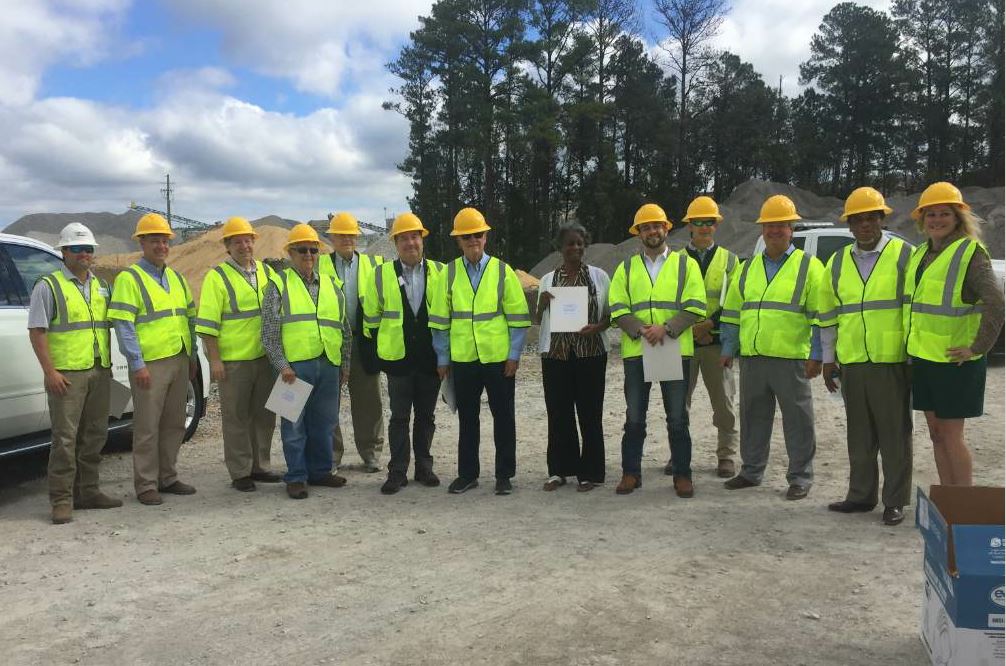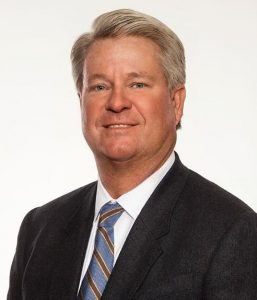Meet the National Exec: John Lyles Harper
BY AsphaltPro Staff

The AsphaltPro staff continues the tradition of introducing the incoming chairman of the National Asphalt Pavement Association (NAPA) with 2019 Chairman John Lyles Harper. He’ll be inducted during the 2019 annual meeting Jan. 20-23 on Marco Island, Florida. He is the senior vice president of Construction Partners Inc. (CPI) and president of Wiregrass Construction Company Inc. (WCC), a wholly owned subsidiary of CPI. Let’s get to know the new chairman.
The Company:
Wiregrass Construction Company Inc. (WCC), a wholly owned subsidiary of CPI
How long has Wiregrass been a member of NAPA?
Since 1984
How long have you been in the asphalt industry?
I grew up in the asphalt industry. I began working part time in the industry while in high school in 1980 and then began working full time after college in 1988. I have a BS in finance from Auburn University.
Family:
Wife, Brandi Cappaert Harper; Children—Nina Madeline Harper, 22; James Bertram Harper, 19; Emily Frances Harper, 3
Pets:
I have a golden retriever named Rebel who loves duck hunting.
Favorite Pastimes:
I enjoy fishing, particularly competitive offshore fishing. I also enjoy hunting and spending time outdoors with my family.

Harper is a competitive offshore fisherman.
How/why did you join the asphalt industry?
My dad, Henry Harper, founded Wiregrass Construction Company in 1965. I grew up in the industry and began working full time as an estimator in 1988. I became president of WCC in 1996 and sold the company to Construction Partners Inc. (CPI) in 2002. After selling to CPI, I continued in my role as president of WCC. I later became a senior vice president of CPI while maintaining my role at WCC. CPI had an initial public offering on NASDAQ in May 2018, and is traded under the symbol ROAD.
What does membership in NAPA and/or your state APA mean to you personally? How has it benefitted your asphalt business?
Personally, I can recall attending the Alabama Asphalt Pavement Association (AAPA) state meetings and NAPA conventions and being fascinated by the various industries that are a part of our infrastructure—quarries, equipment, plants, liquid asphalt. From an asphalt business standpoint, membership in AAPA and NAPA provide you with a wealth of information. They keep you updated on changing specifications and pavement type selection issues, i.e., market share concerns and the concrete industry, as well as on the latest technologies. By far the most valuable benefit of being a part of the industry is the relationships, not just from a business standpoint, but also the long-lasting personal friendships.
In recent months, what are the top two or three positions for which your company has had the most difficulty finding qualified workers?
Experienced equipment operators, truck drivers and paving superintendents. It has become increasingly difficult to find a trained skill force in these areas. It becomes even more challenging when we are paving at night and in difficult weather (i.e. working in the heat and rainouts).
Could you give an example (or two) of a way AAPA assists its members with workforce development?
At the state level, AAPA has participated in different career fairs. AAPA has exhibit booths at multiple industry events and speaks several times a year to civil engineering students. AAPA also sponsors training classes for industry personnel on mix design and plant operations.
Could you give an example (or two) of a way your company works with area employment agencies or workforce development agencies to encourage interest in construction/asphalt as a career choice?
As of late, we are working with Ingram State Technical College and Tutwiler Women’s Correctional Facility on a program for inmates who will soon be released and are looking for employment. We set up booths that show the different employment opportunities we offer. These opportunities include employment in our aggregate divisions, at asphalt plants, and in construction. The need for good, hardworking people is always present. We also recently participated in the 15th Annual Fort Rucker Job Fair, hosted by the Alabama Career Center System, which included over 100 employers from around the state. This proved successful for us; we were able to hire a few good workers who we met at the job fair. When posting current job openings, they are advertised with the Alabama Career Center System, a statewide program, which is visible online and by all Alabama Career Center offices. We participate in career fairs that target junior high school students, showing them career opportunities for students who do not intend to go to college. At each of these career fairs approximately 300+ students are able to see different industries and the many possibilities available to them once they graduate high school. On average we attend three of these junior high events a year.

Construction Partners Inc. went public on the NASDAQ stock exchange May 8, 2018. John Harper shared this statement about the company: “We are bullish about the asphalt industry and our business. We believe CPI is well-positioned for growth in the five Southeastern states in which we operate. Demand for our services across our 30 distinct markets remains strong and is supported by increased funding for roadway repair and maintenance projects. Our proven growth strategy starts with our company culture driven by great people. Our leadership teams and workforce, we believe are the best in the business. We attain, train and retain the best people in the industry. We really focus on training and upward mobility for our people. As we continue to execute on our proven strategy of delivering controlled, profitable growth that we believe will enhance shareholder value.”
What is your favorite method for recruiting new asphalt professionals to the industry in general?
Things have really changed a lot from the days of applying from a newspaper or state unemployment offices. Millennials and Generation Z are looking more toward social media for opportunities and jobs. So many get their news and information from social media, and career openings are no different. More often than not, even if you don’t have a way to apply on social media, just directing interested people to an informative and innovative company website is a good way to show them what your company has to offer, from the working environment to employment benefits. Specifically to CPI, our website has great information about our history and our initiatives, and provides a way for those interested to see what we have available in terms of a career. Social media has proven to be the quickest and cheapest way to broadcast information, and is the most widely viewed, no matter the platform. The future of our industry is heavily reliant upon social media and it is important for attracting the next generation—both from a recruiting perspective as well as public relations.
On a scale of 1 to 5 (1 being none at all; 5 being very much) how much of a threat to the asphalt industry’s market share is the concrete industry in Alabama? Could you share an example?
5. In Alabama, you name it they’ve tried it—from legislation that would have skewed the pavement type selection toward concrete to recently mandating that concrete pavements need to be 20 percent of the market in the state. They are also trying to change specifications with the Alabama DOT (ALDOT) to tilt the balance toward concrete (i.e., setting maximum thickness for concrete pavements, changing the rideability specification, and allowing more non-siliceous materials).

October 2018, Wiregrass Construction Company and Dunn Construction collaborated on a tour of an asphalt plant and the project to widen I-65 south of Birmingham for Alabama state lawmakers.
What are your top two or three ideas for helping NAPA members, and the asphalt industry in general, stay strong in light of PCA/NRMCA desires to increase their members’ market share?
One of the best tools in maintaining and increasing market share is by supporting and utilizing the three strategic initiatives developed by Asphalt Pavement Alliance (APA), which is a partnership with NAPA, the Asphalt Institute and the State Asphalt Pavement Associations (SAPAs). These three initiatives focus on LCCA, commercial paving, and PAVEXpress, and include materials and toolkits that are invaluable for the asphalt industry to maintain and increase market share. A big issue for LCCA is determining the value at the end of the life of a pavement. This is because asphalt pavements, particularly when using a Perpetual Pavement design, typically do not have a structural end of life, and instead the surface only has to be milled and overlaid; on the other hand, concrete pavements have to be totally removed and reconstructed. Other factors that would further promote asphalt over concrete are the economic impact due to the speed of construction and the economic benefit of fuel savings due to asphalt being a smoother pavement.
What other threats to the asphalt industry do you plan to guard against during your year as chairman?
While I don’t see this as a threat, we do need to understand the discussion of autonomous vehicles and how that will affect pavement mix designs, especially due to training. Also increasing the use of thin lift asphalts in lieu of other pavement preservation techniques.
As you take on the travel and engagements of a NAPA chairman, who will assist with your many responsibilities back at your company?
We have an excellent management team at CPI that works extremely well together and can handle any issues that arise in my absence. I find it very important in my role to be a good listener in meetings and let my team express their ideas for improving our strategies.
Get-to-Know John Harper

John Lyles Harper
What do you see as the most important part of your job as the 2019 chairman for NAPA?
My platform is workforce development. NAPA has already made workforce a strategic initiative in its plan and this will be ongoing and important in our industry. We will kick off our convention in January with keynote speaker Mike Rowe who will talk about the challenges the construction industry as a whole has with attracting and retaining workers.
What do you find most enjoyable about being the president of WCC, and how do you expect that experience will influence your activities as 2019 chairman of NAPA?
Just working with all the talented teams we have put together. It’s important for everyone to have creative input in decisions. I enjoy getting involved, being forward thinking, and making it enjoyable and fun to come to work. It is important to get the team involved in company strategy and that applies to NAPA as well.
Could you share with our readers an example of a challenge you’ve overcome in the past and how you overcame it?
During the growth over the past 15+ years with CPI, one of the biggest challenges, especially with new acquisitions, was instilling safety as a core value. By establishing safety directors and safety committees, we have been able to change the culture as it relates to safety. Another challenge was becoming a dad again at 50! It has been a very rewarding experience, especially seeing Emily with her older two siblings. Even though I’m not as quick on my feet now as I was with my older two, I find myself much more patient and easygoing this time around.
Could you share a quote that you find inspiring/motivating?
“Lord, help me to not be so busy making a living that I forget to make a life.” This quote is beside my computer and puts things in perspective for me when things become overwhelming.
